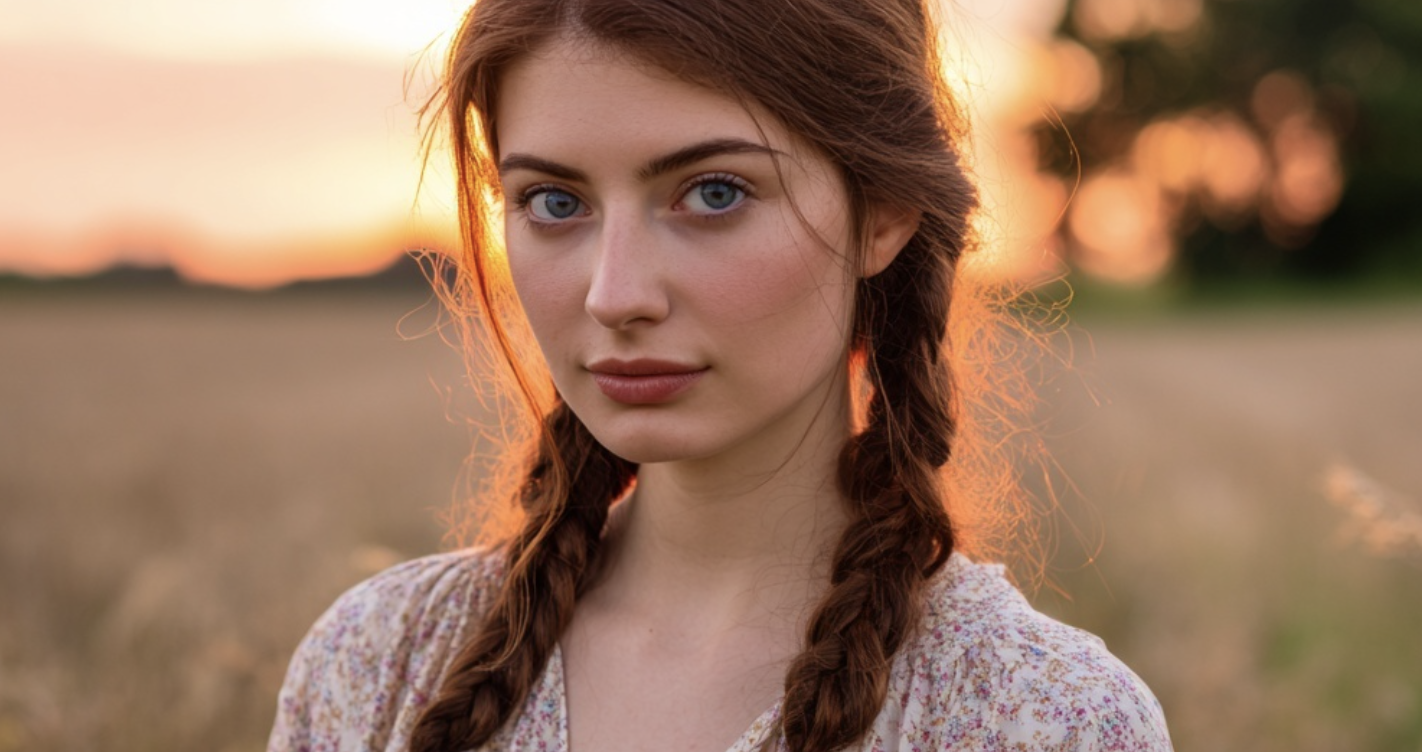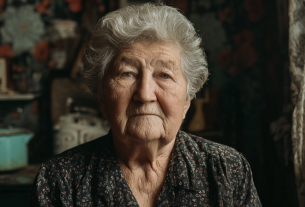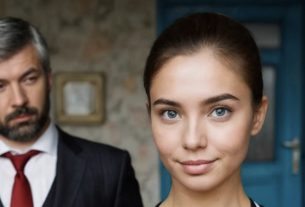A rumor pierced the autumn air of Zaozerye like the first cold wind before a storm. It flew over the leaning fences, rang in the empty buckets by the well, and whispered on the benches where old women gossiped. A “medichka” was coming to them. Not another inspector from the district center, not some mythical doctor from a TV report, but one of their own, a village one who would stay. A feldsher. Someone who would finally open a first-aid station in the abandoned office building.
The villagers had long since stopped hoping. For the past four years, any hope drowned in spring thaws and winter blizzards. Twenty-two kilometers to the district center is not a distance but an eternity when your chest bubbles and aches and the ambulance on the other end of the line answers with fatalism, “Wait, we’re on our way.” You could wait for hours. And if the road washed out—then days. The three kilometers from the highway to the village are an easy stroll in dry weather, when only road dust curls behind your heels. But in rain, in slush, in the autumn murk—it’s an impassable bog, a hellish mash of mud and despair.
Then they would start calling Yefim the tractor driver. He alone, for the entire village, could pull anything out of any mire with his timeworn Belarus tractor. But if the call came in the evening, there was almost no hope. After a hard day, Yefim would drop by the local “hole-in-the-wall”—a tiny shop with a single table, where his drinking buddies were already waiting. He would get blind drunk, sinking into a dense, unbroken oblivion, and no ringing phone could break through that wall of boozy sleep.
That day the bus, puffing, crawled along the rutted highway, bouncing over potholes. Veronika—no, not Ksenia—sat by the window, clutching a plain bag with her belongings to her chest and holding an orange medical case carefully on her knees. Its bright color was the only spot of light in the drab, gray-brown interior of the cabin. She had almost dozed off to the monotonous hum of the engine, when the driver’s harsh, hoarse voice made her start.
“Hey! Who’s for Zaozerye?! Five minutes!”
Veronika’s heart pounded, tightening with fear or anticipation—she couldn’t tell which. She gripped the handles of the case and her bag, ready to get off.
The bus door screeched open and spat her onto the shoulder. The air struck her face—fresh, smelling of rotting leaves, smoke, and a boundless, slightly bitter freedom. It was golden autumn. The sun, no longer scorching but gentle and soft, flooded everything with a honeyed light. Yellow leaves whirled behind passing cars as if seeing them off into a wide, unknown life.
Beside her, a young woman with a tired but kind face and a boy of about ten jumped down to the ground, the boy clutching a box of batteries.
The woman gave Veronika a curious, welcoming look.
“Hello! You’re coming to us, aren’t you? To Zaozerye?”
“Hello,” Veronika answered, her voice a little husky with nerves. “Yes, to the village. I just don’t know where to go.”
“We’ll take you, me and Vanka! We’re coming from the clinic—blood work—and for him we bought school necessities. Come on, we’ll show you. Vanka, help the young lady—take the case!”
The boy reached for the orange handle.
“Oh, no, no!” Veronika flustered. “It’s heavy—there are instruments, medications… I’ll carry it myself.”
The woman looked at the case, and understanding flared in her eyes, mixed with unfeigned delight.
“So it’s you… Our ‘medichka’?! We’ve been waiting for you! First year they promised, then the second—and here you are, in the flesh! Well, thank God! Now we’ll have care of our own! I’m Galina, by the way, and this is Vanya, my boy.”
“Veronika. A feldsher. I was told you have a clinic ready.”
Galina gave a meaningful snort, hoisting her bag.
“The clinic’s there, a little house. What it’s like inside—you’ll see for yourself. Come on, Veronika, let’s introduce you to our backwoods.”
The walk to the village took about forty minutes at an easy pace. But half an hour later, all of Zaozerye was buzzing like a roused hive. The news ran faster than the wind: “She’s here! Young! With an orange case!” It was around three in the afternoon, still light. Galina led Veronika straight to the head of the rural administration—Pyotr Ilyich.
The office smelled of dust, old papers, and power. Pyotr Ilyich, a man with a weathered face and tired eyes, was on the phone, grumbling angrily into the receiver. Seeing the women, he only nodded toward a chair and waved them off, signaling he was busy.
When he finished, he fixed Veronika with a studying, slightly cynical look.
“And you are? What’s your business?”
“Veronika Svetlova. Feldsher. Assigned here. I’ve got two questions for you: where’s the clinic, and where am I to live?” she blurted, trying to keep her voice firm.
Pyotr Ilyich froze, giving her an appraising once-over. In his head ran the thoughts: “Well, well, a feldsher. A slip of a girl. Looks like a recent grad, probably from the city. Already with demands. How’s a thing like that going to treat us old hands? Are there no real doctors left?”
Out loud he said with a slight smirk:
“Veronika… All right then, let me show you your little kingdom. I’ll drive you in my car. As for housing… we’ll see.”
“I was promised separate housing,” Veronika reminded him.
He snorted.
“Who promised? This isn’t a city of a million, miss, it’s a village. No dormitory. Maybe you can rent a room from somebody.”
He unlocked the door of a one-story log house with peeling paint. The door creaked open, letting them into a realm of cold and neglect. The air was stale, steeped in dust and mouse nests. Frost lay in a thin crust on the windowsill. Veronika was seized by icy disappointment mixed with panic.
“It’s freezing in here! And there’s nothing at all!”
“How was I to know when you’d grace us with your presence?” He spread his hands. “Stepanovna’ll come tomorrow—she’ll wash and tidy. We’ll hook up the heat—you’ll be living like in Paris!” He laughed loudly, strenuously at his own joke.
Taking out his phone, he dialed a number.
“Stepanovna? Our feldsher’s arrived. Grab a bucket, a rag, and get over to make the place shine. What? Tomorrow? Better now! Fine, we’ll be waiting.”
He turned to Veronika:
“She’ll be here in a bit. Lives nearby. And by the way, about housing—she’s got a spare room, she’s an old woman living alone.”
Soon Stepanovna herself appeared—a short, wiry woman with a sharp, prickly gaze that showed both wit and skepticism. She stared at Veronika like a market seller sizing up a buyer.
“So you’re our new hope? A half-grown slip of a girl! And how are you going to treat us old and sick ones? No experience, I suppose?”
“I’m a feldsher,” Veronika answered with dignity. “Veronika.”
“Stepanovna,” Pyotr Ilyich cut in, “won’t you let Veronika a room? The poor soul has nowhere to go.”
The old woman slowly raked the girl from head to toe with narrowed eyes.
“You don’t smoke? Don’t drink? Today’s youth is terribly spoiled.”
Veronika shook her head, blushing.
“No, of course not! I don’t smoke or drink. And I don’t advise my patients to.”
“All right then,” Stepanovna muttered. “We’ll manage. Come along, I’m nearby. We’ll see what you’re good for.”
Pyotr Ilyich exhaled in relief.
“Splendid then, Veronika! Everything’s getting sorted. You’ll start work tomorrow morning. I’ll bring the equipment—safes, cabinets, exam couches. Come to me if anything. Our folks are quiet, decent. If you need to go to the neighboring village—I’m your man. Off I go.”
Veronika locked the clinic with the ill-fated padlock and dutifully trudged after Stepanovna. The old woman’s house turned out small but strikingly cozy and warm. It smelled of fresh bread, dried herbs, and cleanliness. In the front room stood an old television, a glass-fronted cabinet with dishes, and a table draped with a snow-white cloth. Order and calm reigned here—the very things so lacking in her new “kingdom.”
The hostess showed her a small room with a single window looking out on the garden. The bed was neatly made; an embroidered cushion lay on the pillows.
“Here’s your cell. It’s quiet here, I live alone, so you’ll sleep like a log. I see you’re a modest girl, not noisy. Only awfully young. How old are you, dear?”
“Twenty-six, Stepanovna. Not a half-pint anymore,” Veronika smiled.
“Twenty-six…” the old woman drew out thoughtfully. “That’s good. On your own? No sweetheart gone missing somewhere?”
“On my own. No one.”
From that day, her new life began. Work that knew no schedule: day and deep night, bitter frost and autumn slush. Together with Stepanovna they scrubbed and scoured the clinic to a sterile shine. It was transformed, began to sparkle, filled with the smell of medicines and antiseptics. Now it inspired not despair but hope.
People didn’t come at once; they came cautiously, sizing her up. Grandmothers with high blood pressure, young mothers for advice, women for “something for the nerves.” Men also showed up with trembling hands and clouded eyes, persistently asking to “splash a bit of spirit to warm up.” But here Veronika was unbending and stern. She didn’t moralize; she simply looked them straight in the eye and said, “Not here and not from me. Go sleep it off.” They would grumble and leave, but their respect for her only grew.
She was busy from dawn to dusk. She ran home to Stepanovna for lunch, but if there were many patients, the old woman herself would bring still-warm cabbage soup and pies to the clinic. Supper always awaited her at home, laid out on a clean tablecloth. Veronika repaid her with boundless gratitude and help around the house. A quiet, sturdy bond arose between them—a strange and touching union of youth and experience.
Winter came, blanketing the village with fluffy snow, then retreated, yielding to dripping eaves and the first timid sun of spring. Veronika worked. And then he appeared in her life.
His name was Artyom. A tall, taciturn gamekeeper with piercing gray eyes the color of a stormy sky. He spent almost all his time in the forest, but when he came to the village he invariably dropped by the clinic—he’d scratched his hand, or he needed a certificate. At first he waved off her offer to sit, then he lingered for a minute or two, and soon they could talk for hours about life, nature, the stars. Then came their evening walks beyond the village, where nothing kept them from walking close—so close their hands brushed.
One morning, right before dawn, when the world lay in its deepest pre-sunrise hush, someone banged on Stepanovna’s window so hard the panes rattled. Both women leapt from their beds as if scalded. Throwing on a kerchief, Stepanovna pulled back the curtain and saw the neighbor’s face twisted with terror.
“Stepanovna! Quick! Where’s the medichka?! Artyom’s been shot! In the forest!”
Veronika’s heart dropped into her heels and stopped. With practiced, automatic movements, she threw on her clothes, grabbed that same orange case, and ran outside. Stepanovna hurried after her, crossing herself.
The clinic doors flew open. Three men, panting and smeared with mud and blood, carried in Artyom on a makeshift stretcher. He was unconscious, his face deathly pale, and on his chest, right over his heart, a terrible ragged patch glowed red.
“Call an ambulance! Quickly!” Her own voice sounded alien to her—metallic, stripped of all feeling but fury and will.
She worked fast, precise; her fingers knew what to do on their own. Stop the bleeding. Treat the wound. Bandage. Find a vein. Give the injection. In her head beat only one thought: “Live. He has to live.” He had lost a lot of blood. While they found him in the backwoods, while they bumped along that road… Every second felt like an eternity.
The ambulance, called by Pyotr Ilyich, seemed to take a lifetime to arrive. Later she would learn the crew left instantly and tore along, wheels screaming. When the medics took him away, Veronika, spattered with blood, collapsed onto the floor and burst into tears, letting the receding panic have its way for the first time through all that nightmare. Stepanovna sat down beside her, put an arm around her shoulders, and stroked her back in a silent, motherly way.
“It’s all right, Veronka, all right, dear… Our falcon will pull through. He will. You did well—didn’t lose your head. I watched—you’re the real thing, iron. Now I know for sure—young you may be, but you won’t fail us, won’t abandon us. Won’t let a man die.” She paused, then added softly, “And you love him. I can see it. The way you looked at him…”
“Stepanovna, please…” Veronika sobbed, wiping her face with a bloody sleeve. “I don’t even know myself…”
“You do, child. Believe me. My eyes are old but sharp.”
The next day, jaw set, Veronika went to Pyotr Ilyich and asked for a car to visit Artyom in the district hospital. The rumor raced through the village at once. And then people began coming to her door. A silent, wordless crowd. They brought whatever they could: fresh eggs, jars of pickles, warm socks, homemade cottage cheese, goose fat “for the chest,” money wrapped in a kerchief. An hour later, two huge, tightly packed baskets stood on Stepanovna’s stoop. Thus provisioned, they sent her to town.
She entered a sunlit ward. Artyom lay by the window with his eyes closed, but the other patients greeted her with approving murmurs. He opened his eyes, and in them—beyond pain and weakness—flared pure, unfeigned wonder. He couldn’t believe it. And she, barely holding back fresh tears, came over, took his cold hand in both of hers, and simply smiled. And that was enough.
When Artyom was discharged, Pyotr Ilyich himself drove him back to the village in his own car. He didn’t hide his pride—after all, the man wounded had been his own nephew, and wounded in the line of duty catching dangerous poachers, the ones who fired. Now the whole village looked at their “medichka” with a new, profound respect. She hadn’t panicked. She had saved the life of their lad. Their Artyom. Now they knew—if trouble came, if God forbid, she would fight for them to the end. She was one of them.
And in summer, when Zaozerye’s meadows drowned in flowers, Artyom and Veronika were married. And Pyotr Ilyich, with no smirks now, ordered the construction of a new cottage for the young family on the edge of the village. Zaozerye’s population was growing. One by one. But growing.
And yet on that very first day, looking at the frail city girl, Pyotr Ilyich had thought, “This little sparrow won’t last with us. She’ll bolt from our frosts, from the impassable roads, from this backwoods.”
But nothing daunted Veronika. Not winter blizzards, not spring mud, not night calls to the neighboring village. She walked, rode in passing carts, slogged on foot—because she loved. She loved her profession. She loved these stern, simple, endlessly grateful people. And they paid her in the same coin—with boundless trust, love, and faith in their own Zaozerye guardian angel in a white coat.



